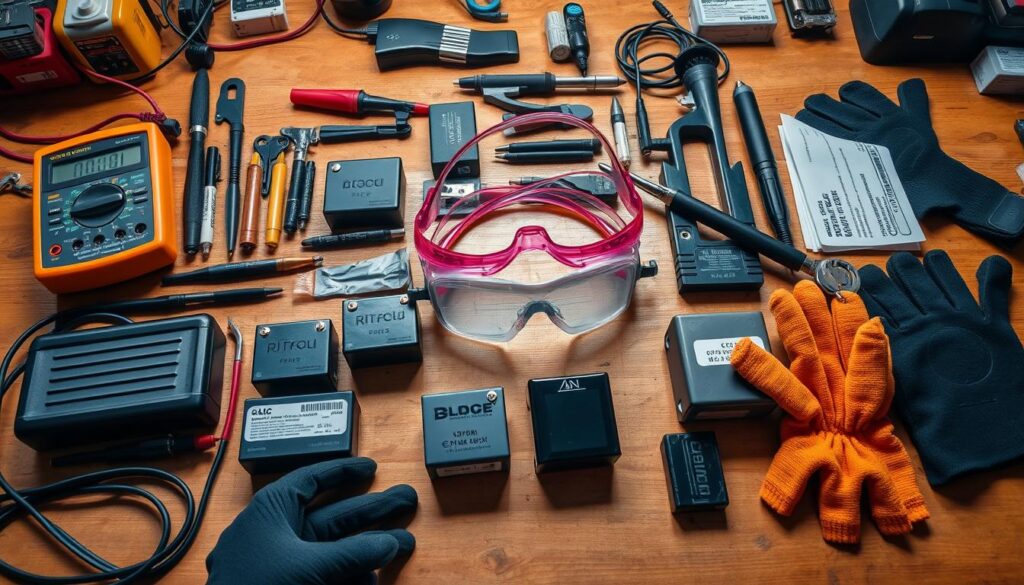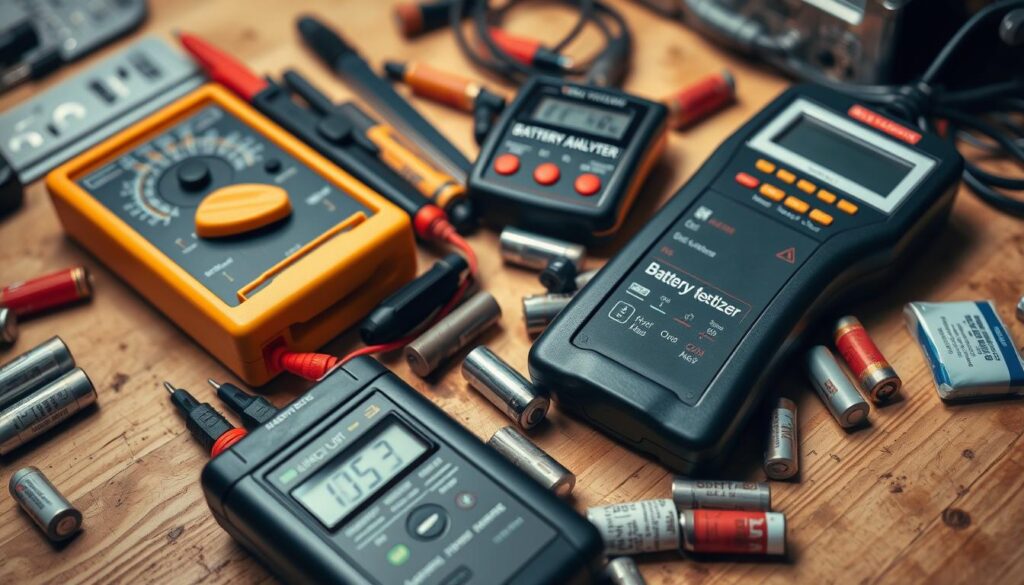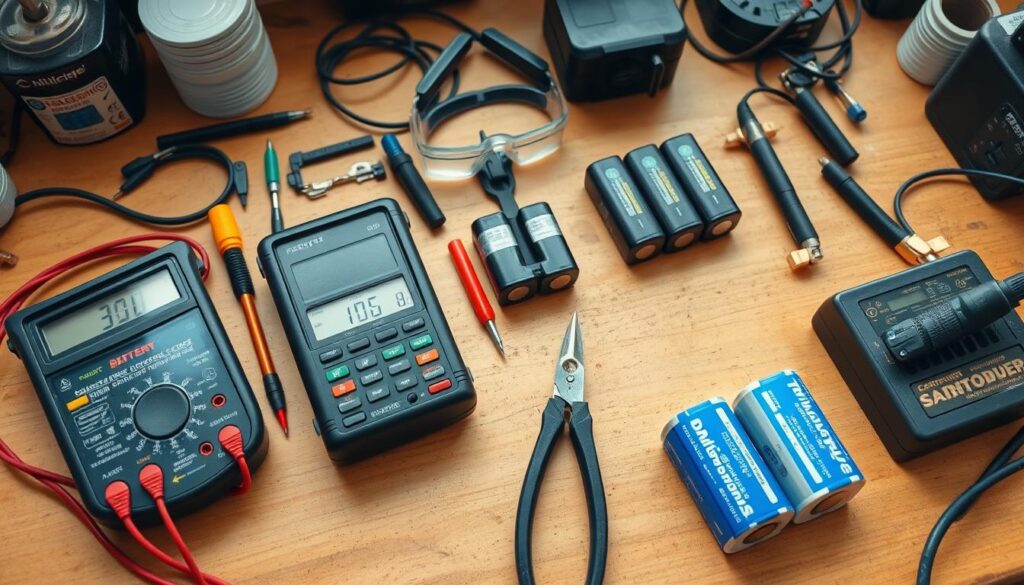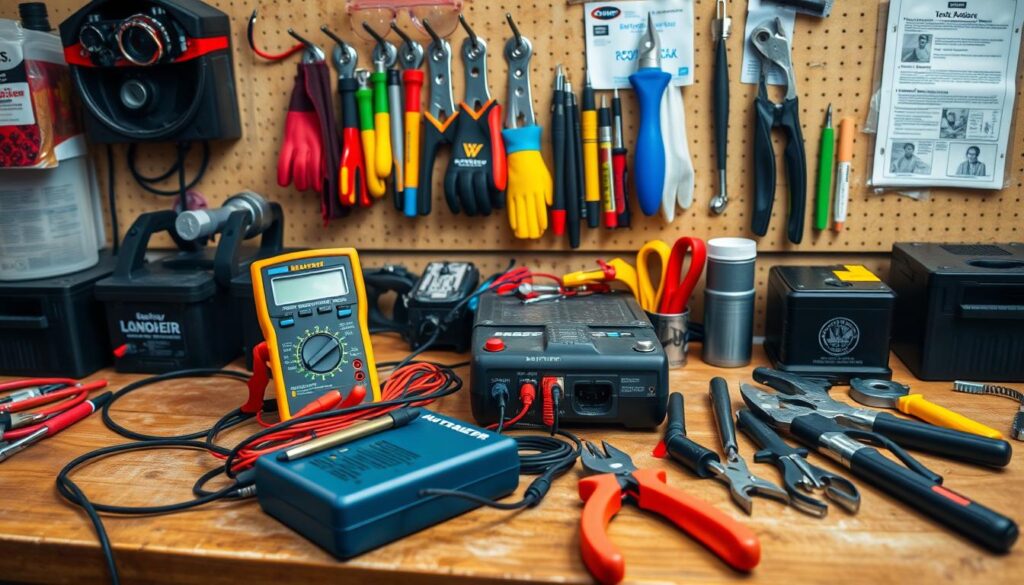Being a battery reconditioning enthusiast means you need the right tools. These tools help you bring dead batteries back to life and make them last longer. You’ll need things like multimeters, battery chargers, and safety gear. A good workshop can save you a lot of money and help you fix batteries quickly and well.
In this guide, we’ll look at the key tools you need. These tools are vital for anyone serious about battery reconditioning.
Key Takeaways
- Multimeters are crucial for testing battery voltage and diagnosing issues.
- Battery chargers help revive and maintain batteries, ensuring optimal performance.
- Load testers assess a battery’s health and ability to hold a charge.
- Safety gear, such as gloves and goggles, protects you during battery work.
- A well-stocked toolkit enables efficient DIY battery reconditioning.
Understanding Battery Reconditioning Tools
Battery reconditioning brings old or weak batteries back to life. It needs special tools and knowledge. These tools help remove sulfation, clean terminals, and add electrolytes.
Having the right equipment is key for safe and effective repair. With the right tools, you can work on many battery types and sizes. This includes car batteries and smaller ones for electronics.
What Is Battery Reconditioning?
Battery reconditioning makes old batteries work like new again. It fixes problems like sulfation buildup or electrolyte loss. The right tools and methods can revive an old battery.
Importance of Having the Right Tools
Good tools are essential for battery reconditioning. They help you check the battery’s health, fix it safely, and do the job well. The right tools ensure a successful battery revival.
| Tool | Purpose | Typical Cost |
|---|---|---|
| Multimeter | Measure voltage, current, and resistance for battery testing | $20 – $100 |
| Battery Charger | Charge and maintain batteries during the reconditioning process | $30 – $150 |
| Battery Load Tester | Assess battery capacity and overall health under load | $50 – $300 |
| Battery Acid | Replenish electrolyte levels in flooded lead-acid batteries | $5 – $20 per gallon |
Investing in the right tools makes battery reconditioning easier. With the right tools and methods, you can revive batteries reliably and effectively.
Safety Gear for Battery Work
When you work with batteries, safety is key. You need the right gear to avoid injuries and keep your work area safe. Let’s look at the safety gear every battery reconditioning fan should have.
Protective Gloves
Acid-resistant gloves are a must for battery work. They protect your hands from battery acid, preventing burns and irritation. Choose gloves made of nitrile or neoprene for long-lasting protection.
Safety Goggles
Protecting your eyes is vital when working on batteries. Safety goggles keep your eyes safe from splashes and debris. Choose wraparound styles for full protection and a comfortable fit.
Face Masks
Battery work can release harmful fumes. A good face mask is essential. Look for N95 or P100 respirators to filter out dangerous particles. Make sure the mask fits well for maximum protection.
Getting the right safety gear is crucial for battery work. With protective gloves, safety goggles, and face masks, you can stay safe and work confidently.

| Safety Gear | Purpose | Key Features |
|---|---|---|
| Protective Gloves | Protect hands from corrosive battery acid | Nitrile or neoprene construction, chemical-resistant |
| Safety Goggles | Shield eyes from splashes and debris | Wraparound design, secure fit, impact-resistant |
| Face Masks | Prevent inhalation of harmful fumes | N95 or P100 respirators, tight facial seal |
“Safety gear is not just a luxury, but a necessity when working with batteries. Protect yourself and ensure a secure work environment by investing in the right protective equipment.”
Essential Hand Tools
Having the right hand tools is key for battery reconditioning. These tools help you measure, adjust, and handle battery parts carefully. They are the base of any successful battery repair.
Multimeter for Battery Testing
A good multimeter is vital for checking battery health. It measures voltage, current, and resistance. This tool helps you find problems, check cell health, and ensure batteries charge and discharge right.
Screwdrivers and Wrenches
Removing battery casings and adjusting terminals need screwdrivers and wrenches. Get a set with slotted and Phillips head screwdrivers. Also, have wrenches in different sizes for various battery types.
Wire Cutters and Strippers
Working with battery cables is important in reconditioning. Wire cutters and strippers help you trim and prepare wiring. This ensures good electrical flow during the process.
These tools are essential for any battery reconditioning kit. They help you measure, adjust, and handle battery parts with care. With these tools, you can start your battery reconditioning journey confidently and efficiently.

| Tool | Purpose | Key Features |
|---|---|---|
| Multimeter | Measure voltage, current, and resistance in batteries | Accuracy, digital display, auto-ranging capabilities |
| Screwdrivers | Disassemble battery casings and adjust terminals | Variety of head types (slotted, Phillips, Pozidriv, Torx) |
| Wrenches | Tighten and loosen battery connections | Standard and metric sizes, combination and open-end styles |
| Wire Cutters and Strippers | Prepare wiring for battery reconditioning | Precision cutting, adjustable stripping settings |
Power Tools for Efficiency
Power tools can greatly improve your efficiency and precision in battery reconditioning. Two key tools are the cordless drill and a top-notch battery charger.
Cordless Drill
A cordless drill is a big help for those who love battery reconditioning. It lets you move freely without being tied down by a cord. This makes it easy to work on batteries quickly and efficiently.
These drills are not only convenient but also powerful. Thanks to new battery tech, they pack a lot of punch and last a long time.
Battery Charger
A good battery charger is essential for your work. Look for one that lets you adjust the amperage. This is key for safely charging different battery sizes and types.
With the right charger, you can make sure your batteries are fully charged and ready to go. This is crucial for keeping your batteries in top shape.
Adding these power tools to your routine can really boost your work. They help you tackle more projects and get better results. Whether you’re working on battery chargers or a full battery repair kit, these tools are game-changers.
Diagnostic Equipment
As a battery reconditioning enthusiast, having the right tools is key. You need a battery load tester and a smart battery analyzer to check your batteries’ health and see how they’re doing during reconditioning.
Battery Load Tester
A battery load tester tests how well your battery holds a charge. It simulates real-world use to show your battery’s condition. This helps you decide if a battery is worth fixing or if it’s time to replace it.
Smart Battery Analyzer
A smart battery analyzer gives a detailed look at your battery’s performance. It shows things like capacity, internal resistance, and state of charge. This lets you see how your battery is improving during reconditioning.
Getting these tools can save you time, money, and stress. They help you make smart choices about your battery projects. With the right tools, you can check your batteries’ health and tackle any challenges confidently.
“Accurate diagnostics are the foundation of successful battery reconditioning. Equip yourself with the right tools to make informed decisions and maximize the potential of your batteries.”
Cleaning and Maintenance Tools
Keeping your battery in good shape is key for its long life and best performance. You’ll need battery terminal cleaners and special cleaning solutions for this.
Battery Terminal Cleaners
Battery terminal cleaners are made to get rid of corrosion and buildup on your battery’s posts and connectors. They remove the white, crusty stuff that can block electricity flow. Using a battery terminal cleaner regularly keeps your battery’s connections clean and working well.
Cleaning Solutions
It’s also important to have the right cleaning solutions. You can use a mix of baking soda and water or buy commercial cleaners. These help get rid of acid and make your battery work better. Just apply the solution, scrub with a wire brush or cleaning tool, and rinse.
Using these tools to keep your battery clean is easy and effective. It helps your battery last longer and work better. Make sure to add battery terminal cleaners and cleaning solutions to your regular battery care routine.
| Tool | Description | Average Cost |
|---|---|---|
| 3M Secure Fit 400 Series Safety Glasses | Protective eyewear for battery work | $5 per pair |
| CRC Brakleen Cleaner | Effective battery terminal cleaning solution | $6 per can |
| NewMainOne Cable Zip Ties | Secure battery cables and connections | $12 per pack of 500 |

Materials for Reconditioning
Choosing the right materials is key for battery reconditioning. You’ll need quality battery acid and special electrolyte solutions. These are vital for bringing your batteries back to life.
Quality Battery Acid
High-purity battery acid is needed to refill lost electrolytes in lead-acid batteries. It keeps your batteries charged and working well. Make sure to use battery acid that’s safe and pure for effective reconditioning.
Electrolyte Solutions
It’s important to find the right electrolyte refills for your battery type. These solutions balance the battery’s chemicals, helping it hold a charge better. A good battery repair kit with the right electrolyte makes the process easier.
Be careful when handling these materials and follow safety rules. Using them wrong or not safely can be dangerous. Always put your safety first when working with battery reconditioning materials.

“Proper electrolyte solutions, matched to specific battery types, are crucial for restoring battery capacity.”
Storage Containers and Organizers
As a battery reconditioning enthusiast, keeping your workspace organized is key. The right storage containers and tool organizers help a lot. They keep your battery recycling equipment and battery repair kit in top shape and easy to find.
Protect Your Reconditioned Batteries with Storage Cases
It’s vital to store your reconditioned batteries in special cases. These cases protect them from moisture, temperature changes, and discharge. Look for cases made for battery storage. They should be strong and have locks to keep your batteries safe.
Keep Your Tools Organized and Accessible
Getting tool organizers can change your workspace for the better. They help you find the right battery recycling equipment and battery repair kit quickly. Think about tool chests, mobile workbenches, and wall organizers to keep your tools handy.
The DECKED Drawer System is a great example. It’s tough, weather-resistant, and mounts in your truck bed. It has big drawers and movable dividers for custom storage.
Good storage solutions make your workspace safer and help your batteries and tools last longer. This means a smoother and more productive battery reconditioning process.

“Proper storage and organization are the keys to a successful and efficient battery reconditioning workshop.”
Upgrading Your Toolkit
Being a battery reconditioning fan means having the right tools is key. You’ll need battery testers and battery chargers that work well. Good tools can really boost your battery fixing skills.
Best Brands for Battery Tools
Top brands like Fluke, Schumacher, and NOCO are leaders in battery tools. They make tools that last and work great. You can find everything from multimeters for checking batteries to smart chargers for better charging.
Essential Accessories to Consider
- Battery desulfators: These tools help keep your batteries healthy by removing harmful buildup.
- Hydrometers: They’re important for checking your battery’s health. A good hydrometer gives you accurate readings.
- Battery post cleaners: These tools keep your battery terminals clean and working well.
Getting better tools can really help you fix batteries better. With the right gear, you’ll feel more confident in your work. This means your batteries will last longer and work better.

“Having the right tools for the job can make all the difference in the world. Investing in quality battery reconditioning equipment has taken my projects to new heights.”
– John Doe, experienced battery enthusiast
Best Practices for Tool Care
As a battery reconditioning enthusiast, keeping your tools in great shape is key. If you ignore tool care, they can wear out fast. This means you might have to spend a lot on repairs or new tools. By following the best tool care practices, you can make your tools last longer and work better.
Cleaning Your Tools Regularly
Cleaning your tools often is the first step in keeping them in good condition. Dirt, debris, and corrosion can harm your battery repair kit and other tools. Make sure to clean your power tools, hand tools, and paintbrushes and rollers after each use. This keeps them working smoothly.
Proper Tool Storage Techniques
Storing your tools right is important for their long life. Power tools need special care because of their motors, gears, and batteries. Hand tools, like hammers and screwdrivers, also need a good place to be stored. Use tool chests, shelves, or the original cases to keep them safe from the weather. Don’t let your tools get too wet, as this can cause rust and damage. If you can, store them in a place with a steady temperature to keep them in good shape.
Always follow the care instructions from the tool’s maker. Regular cleaning, oiling, and sharpening can make your tools last longer and work better for battery reconditioning.

“Proper tool maintenance is the key to unlocking the full potential of your battery reconditioning projects. By taking the time to care for your tools, you’ll enjoy reliable performance and a longer service life.”
Local Resources for Battery Tools
If you love fixing batteries, you have many local places to find what you need. Stores like AutoZone and O’Reilly Auto Parts have the tools you need. They have everything from multimeters to chargers, making it easy to start your projects.
But, the internet is also a great place to find tools. Sites like Amazon and eBay have lots of options. You can compare prices and read reviews to find the best tools for your money.
Where to Buy Battery Tools
- Local auto parts stores like AutoZone and O’Reilly Auto Parts
- Online marketplaces such as Amazon and eBay
Online Marketplaces for Tools
When you’re looking for tools online, check out these sites:
- Amazon – They have a huge selection of tools with reviews to help you choose.
- eBay – You can find lots of tools here, often at good prices. You can compare different listings and see how reliable sellers are.
Using both local stores and online sites, you can create a great toolkit. This will help you do your best work on battery projects.

Joining the Battery Reconditioning Community
When you start exploring battery reconditioning, finding a supportive community is key. Online forums and groups are full of knowledge and friendship. Local workshops and meetups offer hands-on learning.
Online Forums and Support Groups
Places like BatteryUniversity and the r/batteries subreddit on Reddit are goldmines for info. These communities share tips, solve problems, and keep you updated on new methods and tools. You’ll meet others who love battery reconditioning, learn new things, and find creative solutions to problems.
Local Workshops and Meetups
Local workshops and meetups are a game-changer. They’re often found on Meetup.com. Here, you can learn from experts, try things out yourself, and meet others who are just as excited about battery reconditioning. These events are great for improving your skills, learning about new trends, and sharing your own experiences.
FAQ
What are the essential tools needed for battery reconditioning?
You’ll need a multimeter, battery chargers, and load testers. Also, screwdrivers, wrenches, and wire cutters are important. Don’t forget safety gear like gloves, goggles, and face masks.
Why is it important to have the right tools for battery reconditioning?
The right tools help you diagnose and fix batteries well. They also keep you safe. With the right tools, you can remove sulfation, clean terminals, and boost battery capacity.
What safety gear is needed when working with batteries?
You need acid-resistant gloves to protect your hands. Safety goggles shield your eyes from splashes. And a face mask keeps you from inhaling harmful fumes.
What hand tools are essential for battery reconditioning?
A multimeter is key for measuring voltage and current. You’ll also need screwdrivers and wrenches for taking apart batteries. Wire cutters and strippers are for handling cables.
What power tools can enhance the battery reconditioning process?
Cordless drills make removing and reattaching parts faster. High-quality chargers with adjustable amperage are vital for safely charging batteries.
What diagnostic equipment is useful for battery reconditioning?
Load testers check if a battery can hold charge. Smart analyzers give detailed info on capacity and state of charge. This helps you know if a battery is good to go.
What tools are used for cleaning and maintaining batteries?
Special cleaners remove corrosion from battery posts. Cleaning solutions like baking soda or commercial cleaners neutralize acid and improve conductivity.
What materials are needed for the actual reconditioning process?
High-quality battery acid is needed to replenish electrolytes. Proper electrolyte solutions are key for restoring battery capacity, depending on the battery type.
How can proper storage and organization improve battery reconditioning efforts?
Storing batteries in proper containers protects them from damage. Tool organizers keep your workspace safe and your tools in good shape.
Where can battery reconditioning enthusiasts find the best tools and equipment?
You can find great tools at local auto parts stores, online, and in battery enthusiast communities. They offer everything from testing and charging equipment to essential accessories.
How can battery reconditioning enthusiasts stay up-to-date with the latest techniques and tools?
Join online forums, attend workshops, and connect with the community. This way, you can learn new things, get hands-on experience, and share your knowledge and solve problems together.
Click here for a detailed presentation on how to bring old batteries back to life.
Source Links
- 8 Essential Tools Every Car Enthusiast Should Have in Their Garage – Top Flight Automotive
- How to Choose the Right Power Tool Battery: Understanding the Differences Between 12V and 18V Batteries from Scratch
- Cool Auto Shop Tools You Need
- Cordless Tool Battery Pack Repair or Rebuild
- A DIY Guide to Reconditioning and Restoration of Your Toyota Prius Hybrid Battery
- BU-805: Additives to Boost Flooded Lead Acid
- “Battery Chem” Battery Reconditioning and Rebuilding Supplies for Automotive Lead/Acid Batteries. At Home Battery Business Opportunity; Home Based Battery Business Opportunity
- Safety Equipment and Best Practices for EV Work
- 15 Tools Every Car Enthusiast Needs | Holts
- 12 Basic Tools and Toolkits For Car Maintenance
- 8 Essential Tools Every Car Enthusiast Should Have in Their Garage – Top Flight Automotive
- Top 10 Best Cordless Power Tools for DIY Workshop
- The Essential Power Tools for Automotive Cleaning and Maintenance – Deli Group Co.,Ltd.
- The Game-Changing Tool Every Car Enthusiast Needs
- 10 Car Diagnostic Tools for DIYers
- What Tools are Used In A Vehicle Diagnostic Procedure – 26th Street Auto Center
- Rich’s Repair Ramblings #5: Electrical 101, The Battery
- The Essential Tools Every DIY Mechanic Should Own
- Essential Car Tools Packing List for Every Road Trip Enthusiast
- BU-803: Can Batteries Be Restored?
- Reconditioning Lead Acid Batteries with Epsom salt
- Choosing The Right Storage Tool Box For You and The Way You Use Your Tools
- Durable Tool Storage Solutions on Sale
- Upgrading Your Toolkit: Modern Power Tool Accessories
- Upgrade Your Electrical Toolkit with These Must-Have Electronic and Electrical Tools – Deli Group Co.,Ltd.
- Which Power Tool Combo Should I Get?
- Power Tool Maintenance: Golden Tips for Tool Junkies
- The ultimate guide to tool maintenance: Keeping your DIY arsenal in prime condition | DIY Depot
- Tool Maintenance 101: Caring for Your Equipment – Blog – ADA Fastfix Ltd
- Battery, Cordless & Power Tool Kits
- Festool
- Reviving Batteries: A Comprehensive Review of the EZ Battery Reconditioning Course
- Battery Reconditioning

